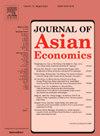Does parental migration matter in access to academic high schools for left-behind children in China?
IF 2.9
3区 经济学
Q1 ECONOMICS
引用次数: 0
Abstract
Enrolling in academic high schools always predicts one can have higher educational achievements, such as access to university later. Using data from China Family Panel Studies, this paper examines whether and how parental migration affects the high school attainment of left-behind children. Results indicate that exposure to parental migration in childhood lowers the probability of attending vocational high school but increases the likelihood of enrolling in academic high school. The effect is more substantial for the left behind children who are from rural areas, with siblings, or second-born or later. The findings also suggest a potential psychological mechanism that inhibits the educational achievement of left-behind children. Specifically, left-behind children exhibit lower expectations for educational attainment and hold beliefs that individual success is attributed to external factors, which may discourage them from pursuing higher education achievements. Further, migrant parents also show lower expectations for their children's educational attainment. Our findings highlight the crucial role of psychological manifestations induced by parental migration in determining high school attendance and offer insights for developing policies aimed at promoting educational equity.
中国留守儿童进入高中学习的机会与父母的迁移有关吗?
就读学术型高中总是预示着一个人可以获得更高的教育成就,比如日后进入大学。本文利用中国家庭面板研究的数据,研究了父母移民是否以及如何影响留守儿童的高中学业。结果表明,父母在儿童时期的迁移会降低留守儿童就读职业高中的概率,但会增加他们就读学术高中的概率。对于来自农村地区、有兄弟姐妹、第二胎或更晚出生的留守儿童来说,这种影响更为显著。研究结果还表明,一种潜在的心理机制抑制了留守儿童的教育成就。具体来说,留守儿童对教育成就的期望较低,认为个人的成功归因于外部因素,这可能会阻碍他们追求更高的教育成就。此外,外来务工父母对子女受教育程度的期望也较低。我们的研究结果凸显了父母移民所引发的心理表现在决定高中入学率方面的关键作用,并为制定旨在促进教育公平的政策提供了启示。
本文章由计算机程序翻译,如有差异,请以英文原文为准。
求助全文
约1分钟内获得全文
求助全文
来源期刊

Journal of Asian Economics
ECONOMICS-
CiteScore
4.70
自引率
9.40%
发文量
90
期刊介绍:
The Journal of Asian Economics provides a forum for publication of increasingly growing research in Asian economic studies and a unique forum for continental Asian economic studies with focus on (i) special studies in adaptive innovation paradigms in Asian economic regimes, (ii) studies relative to unique dimensions of Asian economic development paradigm, as they are investigated by researchers, (iii) comparative studies of development paradigms in other developing continents, Latin America and Africa, (iv) the emerging new pattern of comparative advantages between Asian countries and the United States and North America.
 求助内容:
求助内容: 应助结果提醒方式:
应助结果提醒方式:


